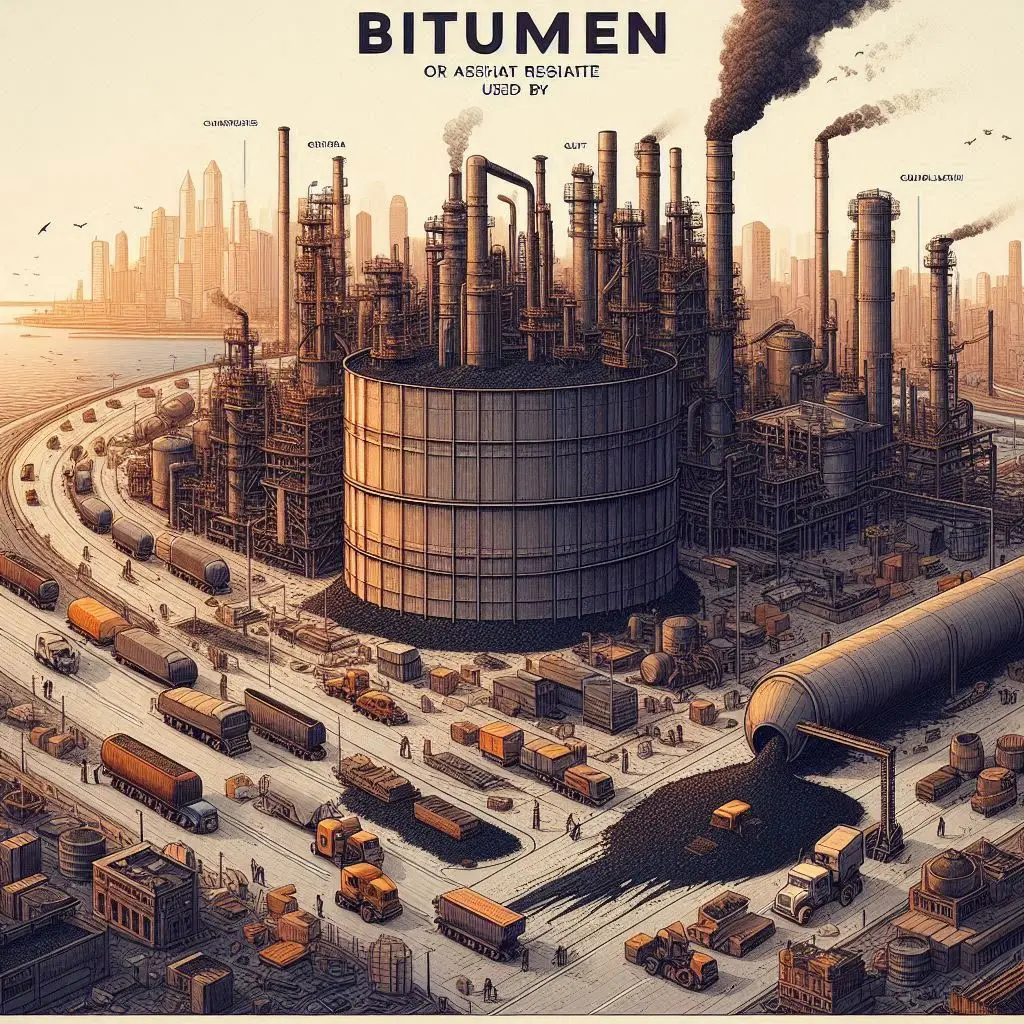
Bitumen or asphalt residue was used by
This essay, Bitumen or Asphalt Residue was used by, examines the manufacturing, characteristics, historical importance, and range of uses for bitumen, also known as asphalt residue.
Throughout human history, bitumen—a thick, sticky, and very viscous material produced from crude oil—has been essential for many different purposes. Its main use is in the building sector, where it is often called asphalt. As a byproduct of refining crude oil, asphalt residue has been essential to the growth of transportation and infrastructure networks.
Bitumen, sometimes known as asphalt residue, has been essential in forming human civilization for ages, from prehistoric uses for waterproofing to the present day of road building and beyond. Because of its adaptable qualities, which come from the special qualities of crude oil, it is an essential ingredient in many different industries. The performance and sustainability of bitumen-based products are being improved by continuous research and technology developments in refining processes. Bitumen will probably continue to be crucial to the advancement of industrial applications, environmental sustainability, and infrastructural development as we go, making it an essential component of human civilization.
Bitumen, sometimes known as asphalt residue, is a material that straddles the boundaries of economic effect, technical innovation, historical relevance, and environmental issues. Its progression from traditional waterproofing uses to contemporary infrastructural building illustrates the fluidity of human advancement. The continuous pursuit of sustainability and resilience in bitumen-based goods guarantees that this adaptable substance will have a crucial position in influencing the course of global industrial, transportation, and construction activities in the future.
Historical Significance: Bitumen has been used for waterproofing and adhesive purposes since the dawn of human civilization. Bitumen was used in Mesopotamia to waterproof structures and caulk vessels. It was used by the ancient Egyptians in their mummification procedures. As civilizations advanced, they became aware of its binding qualities and started using it to build roads.
Bitumen's characteristics: Bitumen has a distinct set of characteristics. At high temperatures, it is a very viscous liquid; at lower temperatures, it solidifies. It is appropriate for a wide range of applications because of its temperature-dependent behavior, particularly in road building. Additionally, bitumen has strong adhesive qualities that enable it to firmly bind a variety of materials together.
Method of Production: Crude oil is distilled to produce bitumen. The heaviest fraction—which comprises bitumen—is separated during the refining process. To get the required uniformity and quality, the bitumen goes through further processing. After that, the finished product—also referred to as bitumen or asphalt—is prepared for use in a variety of applications.
Bitumen applications:
Road Construction: Building roads is one of the most important uses of bitumen. Bitumen and aggregates combined to create asphalt provide a resilient surface that can endure weather and traffic loads. Global transportation infrastructure has transformed because of this application.
Roofing: Bitumen is used in the manufacturing of roofing membranes and asphalt shingles. Because of its waterproofing qualities, it's the best material to shield structures from the weather and moisture.
Bitumen works well as an excellent waterproofing material. To prevent water infiltration, it is often used to seal tunnels, basements, and foundations.
Pavement Preservation: Bitumen emulsions are used in strategies for preserving pavement. By revitalizing and prolonging the life of current road surfaces, these emulsions support economical maintenance plans.
Industrial Processes: Bitumen is used in the production of paints, adhesives, and coatings, among other industrial processes.
Environmental Considerations: Although bitumen has helped to advance infrastructure, there are environmental risks associated with its production and usage. The main source of bitumen, crude oil, is extracted and refined, which increases carbon emissions and degrades the environment. Furthermore, bitumen use in road building, roofing, and other sectors may cause runoff and leaching, which may hurt ecosystems and water quality.
There are initiatives in place to deal with these environmental issues. To lessen the need for fossil fuels, academics and business experts are looking for bitumen alternatives such as bio-based or recycled materials. In addition, advances in pavement design and construction methods seek to maximize environmental impact reduction and energy efficiency to improve the sustainability of asphalt roads.
Technological Innovations: The development of bitumen-based goods has been greatly aided by technological advancements. Bitumen treated with polymers, for example, improves the performance properties of asphalt by increasing its resistance to cracking and deformation. The adoption of nanoengineering techniques is being investigated to further improve bitumen's lifetime and durability in a variety of applications.
Another noteworthy advance in asphalt technology is the invention of warm-mix asphalt. fewer production temperatures made possible by these technologies result in less energy use and greenhouse gas emissions throughout the asphalt manufacturing process. These kinds of technologies support both cost-effectiveness and environmental sustainability in the building of roads.
Impact on the World and Economic Significance:
Because of continued urbanization, infrastructure development, and the growth of transportation networks, there is still a significant need for bitumen worldwide. The bitumen industry is still expanding as nations work to modernize their current infrastructure and increase connections. This promotes economic growth and generates employment possibilities in the building, refining, and extraction industries.
Furthermore, bitumen is becoming a major commodity in global commerce. Producing nations often export goods based on bitumen to satisfy the needs of other countries carrying out significant building projects. The bitumen market around the globe is influenced by changes in regulations, geopolitical events, and the price of crude oil, underscoring its relationship to wider economic patterns.
Upcoming prospects:
In the long run, bitumen will depend on how well environmental issues are handled in conjunction with the increased infrastructure demands of a growing population. The use of bitumen will probably change in the future due to sustainable practices, the ideas of the circular economy, and continuing research into substitute materials. Governments, businesses, and academics must work together to create creative solutions that balance the needs of the environment with the usefulness and performance of bitumen-based goods.

